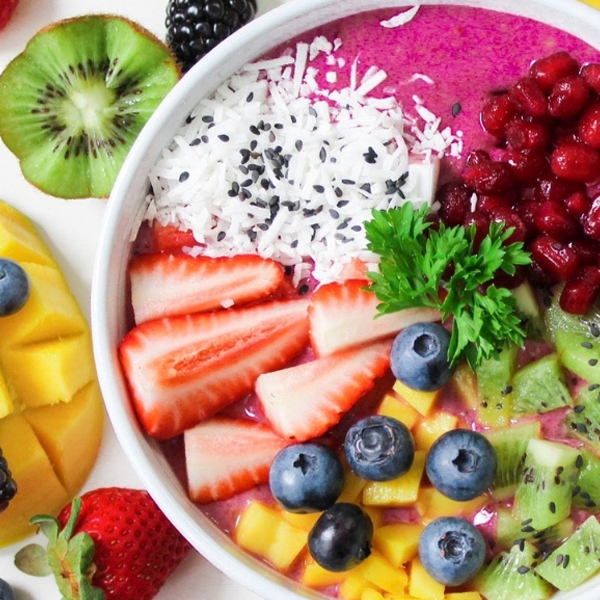30 Aug RAW FOOD NUTRITION – TO COOK OR NOT TO COOK

Written by Dr Tim Crowe ・ 10 mins
Raw food eating is one of today’s hottest dietary trends. So does this mean you should pause and think twice before obliterating the nutrients in your food every time you cook it? Fear not – on the scales of health, there is little to be concerned about.
Cooking food is something we have done since the first caveman threw a mammoth steak on the fire. While it is true that cooking does cause chemical changes in food and a loss of some nutrients, it is a clear case of being alert and not alarmed.
Every time we cook food, there is some degree of nutrient loss. Exposing food to heat, oxygen or light alters the nutrients found in food. It is not all bad news though because cooking food also has its advantages. Cooking food can increase its digestibility, meaning you will get more nutrients out of it.
And even though there may be less of some nutrients from cooking, it is swings and roundabouts as the availability of certain phytonutrients increases. And of course, let’s not forget that heating food kills some of the nasty microbes that can cause food poisoning.
Eating In The Raw
The principle behind a raw food diet is that cooking food destroys the natural enzymes and nutrients that would otherwise give us optimal health and control body weight. A raw food diet is almost entirely plant-based and includes fruits, vegetables, nuts, seeds, grains, vegetable oils and juices in their natural uncooked state.
Now on the pro side for a raw food diet, it means if you are currently eating a lot of processed food, then switching to raw food will be a clear nutritional win. So that gets a big tick.
Unquestionably, there are many benefits to eating plenty of fruits and vegetables. These foods are high in nutrients and fibre and low in kilojoules. But is raw superior to cooked? A review of 28 research studies found eaters of both cooked and raw vegetables had a lower risk of cancer compared to people who did not eat many vegetables in the first place.
Where the science gets murky is the claim that raw food is better because cooking destroys the enzymes found in plants. It is 100 percent correct that cooking will do this. But so too does digestion. Few enzymes survive their trip through the hydrochloric acid spa bath in the stomach. And those plant enzymes are essential only to the plants. The human digestive tract makes all the enzymes needed for digestion.
On the con side, choosing an exclusively raw-food diet can potentially put a person at a small disadvantage. When you exclude all cooked foods, you also exclude many healthy foods, and the nutrient diversity of your diet narrows.
Take the nutrient powerhouses of beans and lentils. When cooked, they are a cornerstone to super-healthy vegetarian, Japanese and Mediterranean diets. Legume-based diets have many health benefits including the prevention and management of obesity, heart disease and stroke, diabetes and metabolic syndrome.
Cooking can also destroy some of the anti-nutrients found in foods that bind minerals in the gut and interfere with absorption.
And the elephant in the room when it comes to cooking is not what it adds, but what it takes away. Cooking food at 75°C or hotter will kill most bacteria that cause food poisoning.
Nutrient Losses Quantified
So the big question: just how much of the nutrients in food do we lose when we cook it? Fortunately, the good people at The United States Department of Agriculture have compiled a detailed table of nutrient losses for 16 vitamins and eight minerals from 290 foods using a variety of cooking methods. For anyone overtly fixated on just what proportion of nutrients they are losing when they cook food, this is the best resource you will find.
A quick glance at the table will show you that most minerals are unaffected by cooking. It is really only vitamin C, folate and thiamin that stand out as being the main nutrients lost, but even then, levels rarely drop to half of their original value.
Losing vitamin C, thiamin and folate from cooking vegetables is easily offset by eating foods that are high in these nutrients and not normally cooked further. Citrus fruits are an excellent source of vitamin C. You will find lots of folate in leafy green vegetables, avocados and bread (which is fortified with folic acid). Vegemite is packed with thiamin and because of fortification, bread contains lots of it too.
Putting nutrient losses from cooking into context, just storing fruits and vegetables for several days means a gradual loss of vitamin C. Fresh will always be best, but frozen vegetables are certainly an option to consider as they are blanched and frozen very soon after picking, effectively “locking in” their nutrients for months.
A study that examined the nutrition delivered in eight common vegetables and 10 common fruits across fresh, frozen and canned packaging found frozen and canned produce to be just as cost-effective and nutritious as the raw fresh option.
The benefits of cooking
Food is much more than just the essential vitamins and minerals. There are hundreds of bioactive compounds found in plant foods that have favourable health benefits. These bioactive compounds can serve as antioxidant and anti-inflammatory agents and have anti-cancer and antibacterial roles as well.
Cooking losses of bioactive nutrients are considered small. In many cases, cooking actually increases the levels of some of these substances. That’s because heating food breaks down plant cell walls so they can release more of the nutrients.
A good example is from the many studies that have shown that levels of the beneficial antioxidant, lycopene (which gives foods like tomatoes their red colour) is much higher in cooked tomatoes than in uncooked tomatoes. The reason why is that the heat breaks down the plants’ thick cell walls, making more of the nutrients available to absorb. A study from The British Journal of Nutrition found that people who followed a raw food diet had normal levels of vitamin A and relatively high levels of beta-carotene, but lower levels of lycopene.
Then there was the report from Journal of Agriculture and Food Chemistry that found that boiling and steaming better preserves antioxidants in carrots, zucchini and broccoli compared to frying them. In all cases though, antioxidant levels increased because of the cooking method compared to the raw state of the food.
Though it is not all good news about cooking as some research shows that some vegetables such as broccoli could have better health benefits raw rather than cooked. In this case, heat damages the enzyme myrosinase, which breaks down glucosinates found in broccoli into a compound known as sulforaphane. Sulforaphone is an anti-cancer compound found in cruciferous vegetables such as broccoli. It appears to have general, but potent antioxidant and possible anti-inflammatory actions similar to curcumin.
What to do about the broccoli dilemma then: to cook or not to cook? The middle ground here is to lightly steam it so it’s cooked but still crunchy as this seems to minimise sulforaphane losses. With a crisp and tender texture and more flavour, you’re likely to eat more of it and that is what matters the most.
Getting The Most Benefit From Food
So what are the best ways to you make sure you get the highest retention of nutrients during cooking? The three keys are water, temperature and time.
As temperature, cooking time, and water volume go up, so too do nutrient losses. If you can, try steaming rather than boiling as this helps to cut down on nutrient leaching. Or if you do boil, try and reuse the water in the dish. Soup’s up!
Dr Tim Crowe is a research scientist and educator. He is also a freelance health and medical writer and scientific consultant. His website is Thinking Nutrition.
Inspired to get into the kitchen? Find delicious buddha bowl recipes on the PLAY Blog right here.



